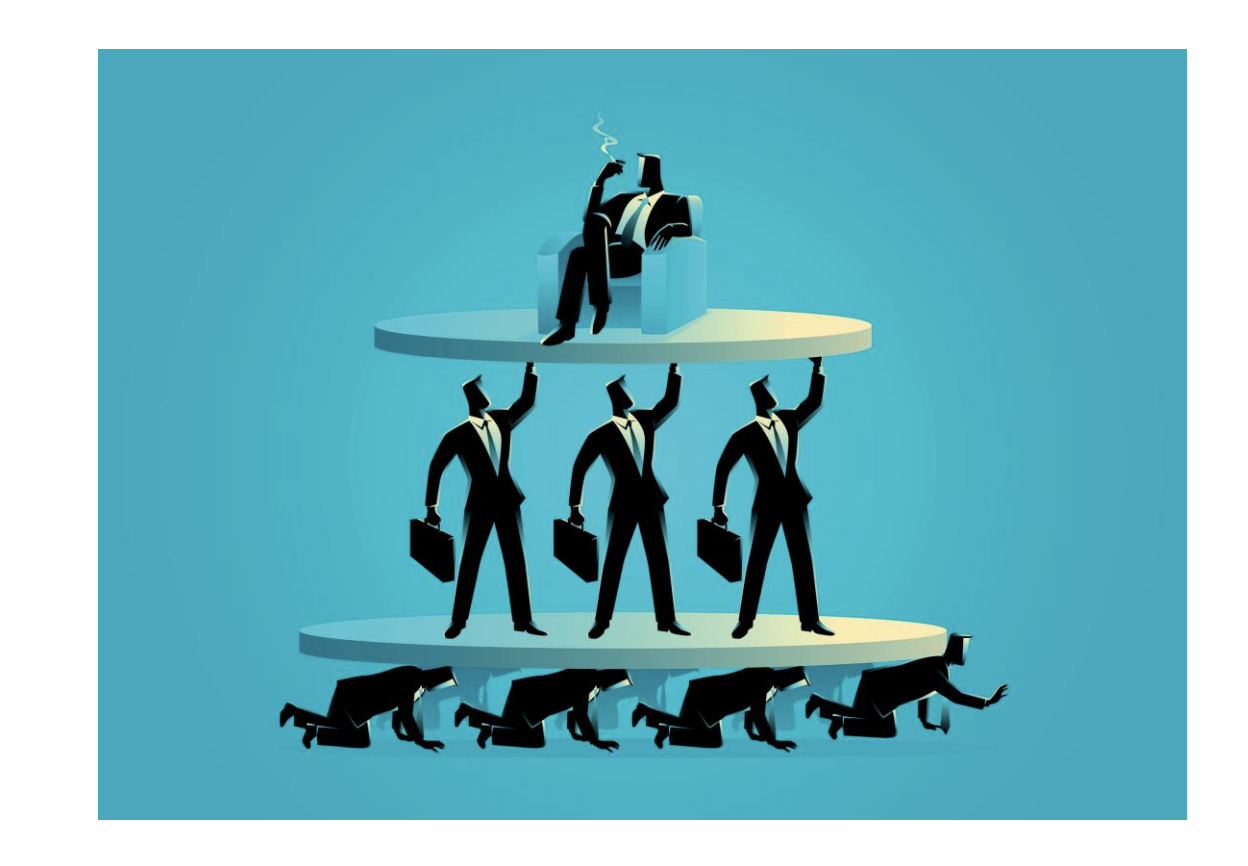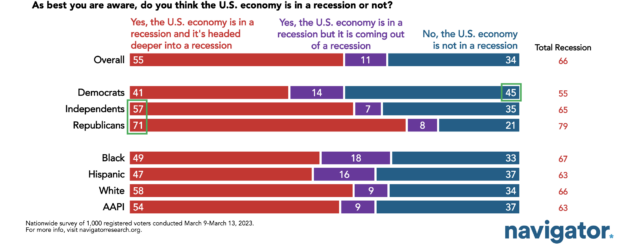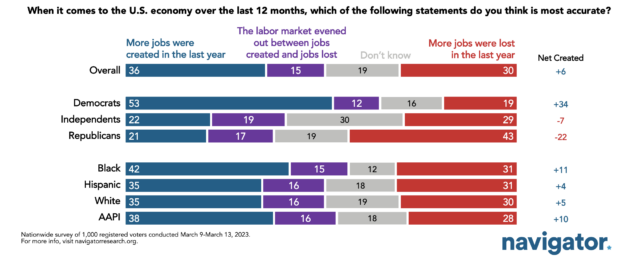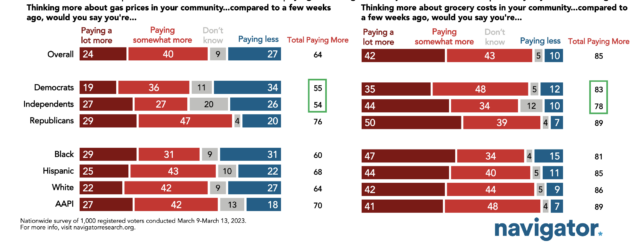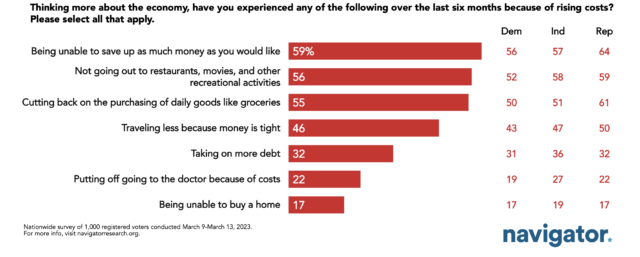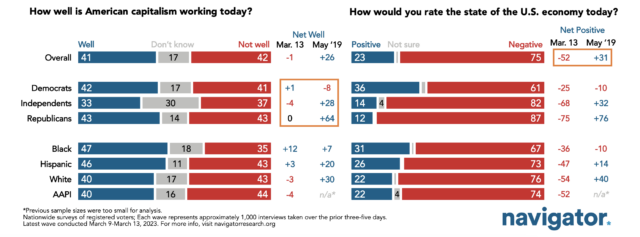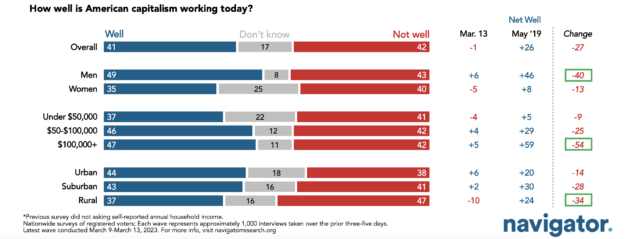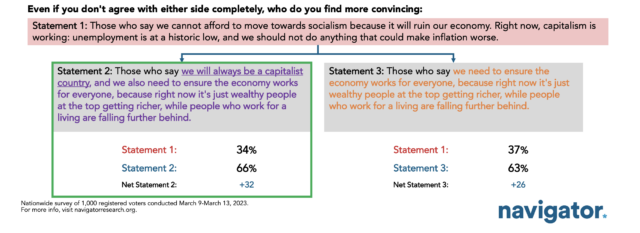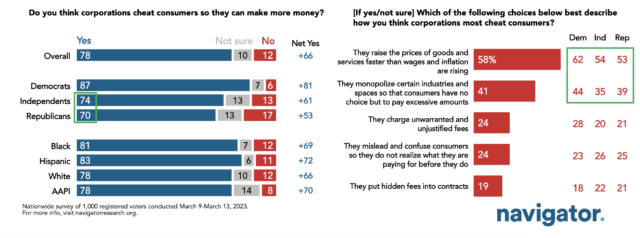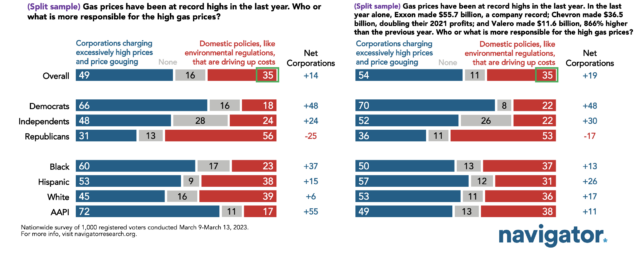- Two in three believe the U.S. is currently in a recession; however, a plurality say more jobs were created than lost in the last year.
- Majorities report being unable to save up as much money as they would like, not going out, and cutting back on purchasing daily goods like groceries because of high costs.
- Since 2019, there has been a decline in views of how well American capitalism is working in parallel with dramatically worse ratings on the economy.
- Messaging that emphasizes regulations as an important way to protect workers and everyday people from the rich rigging the system to their advantage is the best rebuttal to a conservative, pro-free market argument.
A Majority Believe the U.S. Is Currently in a Recession and Headed Deeper Into One
Majorities of independents (57%) and Republicans (71%) believe “the U.S. economy is in a recession and it’s headed deeper into a recession,” while nearly half of Democrats (45%) say “the U.S. economy is not in a recession.”
A Narrow Plurality Believe More Jobs Were Created Than Lost in the Last Year
A majority of Democrats (53%), along with pluralities of every racial group, believe that “more jobs were created in the last year.”
Americans Are Feeling More Pressure on Grocery Price Increases Than Gas, Though Prices Are Higher on Both
Americans are feeling the pinch both at the pump and at the grocery store: but, while 85% say they’re paying more for groceries than they were a few weeks ago, just 64% say the same on gas.
- While 78% of independents and 83% of Democrats are paying more in groceries, just 54% and 55% respectively say the same on gas.
Majorities of Americans Report Being Unable to Save, Are Not Going Out, and Are Cutting Back on Groceries As Costs Rise
One in three Americans overall (32%) and 36% of independents report taking on more debt because of rising costs; at the same time, one in five Americans overall (22%) and 27% of independents report putting off going to the doctor because of rising costs.
Since 2019, There Has Been a Major Decline in Views of Capitalism, in Tandem with Declining Ratings of the Economy
Since May of 2019, views of the economy have declined dramatically among independents (from net +32 positive to net -68) and Republicans (from net +76 to net -75); at the same time, their views on capitalism have also declined (from net +28 working well to net -4 among independents, from net +64 to net 0 among Republicans).
Declines in Views of Capitalism Most Pronounced Among High Income Earners, Men, Rural Americans
Compared to 2019, views of American capitalism have declined most among those earning over $100,000 per year (from net +59 in May 2019 to net +5 today), men (from net +46 to net +6), and those in small towns and rural communities (from net +10 to net -24); that said, views of the economy have declined dramatically among these groups in the last four years.
Americans Want a Focus on Making an Economy That Works for Everyone, With or Without Capitalism
In response to a conservative statement that capitalism is working and we cannot move towards socialism, messaging that emphasizes that we “need to ensure the economy works for everyone, because right now it’s just wealthy people at the top getting richer” is compelling. Mentioning “we will always be a capitalist country” drives support up to net +32 agreement. Without that, the progressive statement is still at net +26 agree more over the conservative statement.
The Strongest Pro-Regulation Message Focuses on Workers and Pushing Back Against the Rich and Their Rigging of the System
A message on regulations making Americans safer and saving costs is effective over a conservative, anti-regulation free market message (net +14 more convincing), but a message about “the right rules and regulations to make the economy work for everyone” is strongest (net +28 more convincing).
- A message that “some people who talk about free markets… [want to] create an economy that serves those at the top at the expense of everyone else” only breaks even against the conservative message (net +0).
Corporations Are Seen As Cheating Consumers By Raising Prices and Using Monopolies to Overcharge
Nearly three in four independents (74%) and seven in ten Republicans (70%) say corporations cheat consumers so they can make more money, and they are most likely to say corporations do so by “[raising] the prices of goods and services faster than wages and inflation are rising” (54% and 53%, respectively) and “[monopolizing] certain industries” to overcharge consumers (35% and 39%).
Corporations Are More Blamed Than Domestic Policies for High Gas Prices, With or Without Gas Company Profits
Incorporating messaging about record gas company profits increases the share of Americans who blame “corporations charging excessively high prices and price gouging” (from 49% to 54%), though the share who blame “domestic policies” is the same in both cases (35%).
